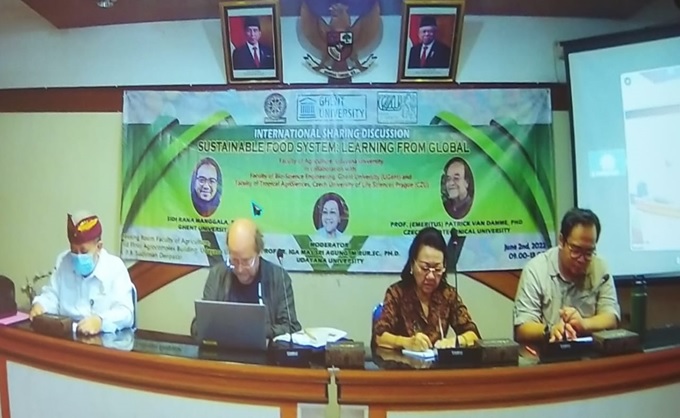Faculty of Agriculture UNUD held an International Sharing Discussion with the theme “Sustainable Food System: Learning from Global”
DENPASAR - Faculty of Agriculture, Udayana University held an International Sharing Discussion with the theme "Sustainable Food System: Learning from Global". This discussion was held on June 2, 2022 in the UNUD Faculty of Agriculture Meeting Room which is located on the 2nd Floor of the Agrocomplex Building (Joint Laboratory) Udayana University, Jl. P.B. Sudirman, Denpasar. This activity was held in a hybrid manner (offline and online) which was attended by lecturers of the Faculty of Agriculture UNUD as participants and presented 2 speakers, namely Prof. Patrick van Damme, Ph.D. from the Czech Agrotechnical University, Sidi Rana Manggala, Ph.D. from Ghent University, Belgium, and moderated by Prof. Ir. IGA Sri Agung, M.Rur.Sc., Ph.D.
This international discussion began with remarks by the Dean of the Udayana Faculty of Agriculture who in his speech expressed his gratitude to the speakers and participants who had attended this activity, "hopefully this activity can provide benefits, especially in the world of agriculture", he added.
The first speaker, Prof. Patrick explained about sustainable food, especially cocoa, from cultivation to post-harvest. The highest cocoa production is in Africa and the second is in Ghana, but the system is not yet maximized. Prof. Patrick said that the maximum system would be able to increase the production of cocoa plants. Because currently cocoa development is heavily influenced by climate change. Prof. Patrick added that to maintain and increase cocoa production, system management can be done, such as: reduction of wind speed, reduction in fruit abortion, protection against windborne spores of fungus, maintenance of soil fertility, reduction of excessive vegetative growth, reduction of nutritional imbalances. and dieback, etc. One of the causes of farmer dissatisfaction and poverty is that more than 90% of cocoa is produced by small farmers (owning less than 5 hectares with an average of 3 hectares). The main source of income for 4.5 million farming families, and globally 14 million people work in cocoa farming. In West Africa alone, 58% of cocoa farmers do not have a livelihood, so they have no income. With the decline in cocoa production that farmers are able to produce due to the impact of climate change, this has an impact on farmers' income which also decreases. So it is necessary to have a technology or management system in cocoa cultivation that is more optimal as stated by Prof. Patrick.
Next, the second speaker was Sidi Rana Manggala, Ph.D. presented material with the topic "Toward a Global Sustainable Food System". Dr. Sidi explained that to maintain food or sustainable food is to maintain the existing ecosystem. In this case, the ecosystem in question is energy, land, and water. "When the ecosystem is maintained, it will produce a complex matrix with various benefits, such as producing quality products but maintaining quantity to meet market needs, and will make farmers have income to meet their daily needs," explained Dr. Sidi. In addition, Dr. Sidi added that to keep the ecosystem in balance, the smallest thing we can do is to minimize the frequency of food waste, namely by consuming food according to needs, not as desired.





